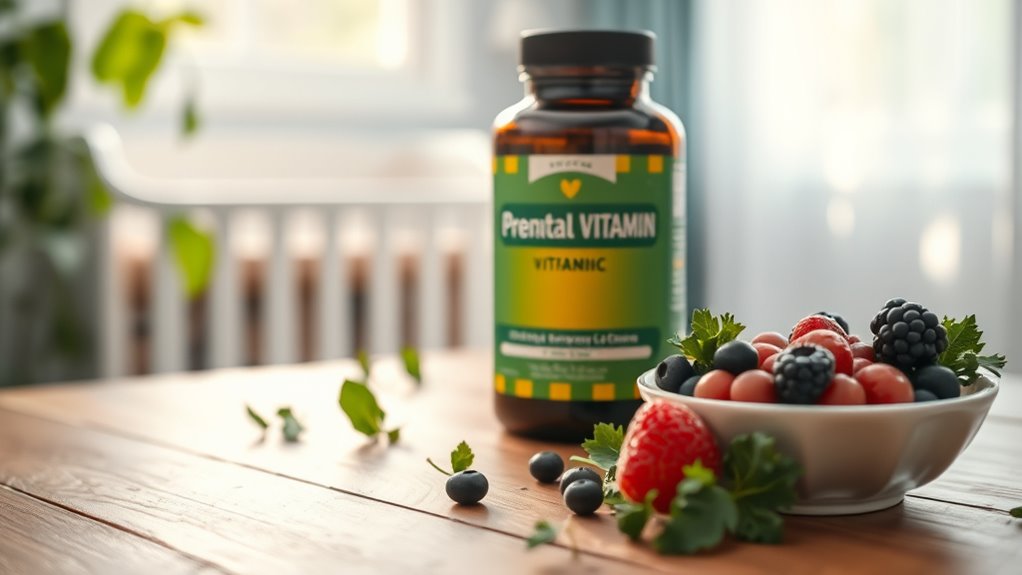Folic acid is essential for you if you’re planning to conceive. It helps prevent serious birth defects, especially neural tube defects, which can occur early in pregnancy. To reduce these risks, it’s vital to take at least 400 micrograms daily, starting a month before conception. While you can get folic acid from foods like leafy greens and fortified grains, supplements are often recommended. Discover more about the role of vitamin D and other important nutrients for your pre-pregnancy health.
Key Takeaways
- Folic acid is crucial for DNA synthesis and tissue formation, supporting overall growth and development before pregnancy.
- Supplementing with folic acid reduces the risk of neural tube defects (NTDs) by up to 70% in newborns.
- The CDC recommends a daily intake of at least 400 micrograms of folic acid starting one month prior to conception.
- Dietary sources like green leafy vegetables may not provide sufficient folic acid, making supplements essential for adequate intake.
- Women with a family history of NTDs should consult healthcare providers for potentially higher folic acid dosages.
What Is Folic Acid?

Folic acid, also known as vitamin B9, is an essential nutrient for your body’s growth and development. This B vitamin plays a significant role in DNA synthesis, cell growth, and tissue formation, especially during pregnancy. Including whole foods in your diet can help ensure you receive adequate folic acid and other vital nutrients.
If you’re pregnant or planning to conceive, it’s important to consume at least 400 micrograms of folic acid daily. This intake helps prevent serious birth defects, particularly neural tube defects, which can affect the brain and spinal cord of your developing fetus. Additionally, understanding the importance of advance directives can help ensure that your healthcare wishes are respected during this critical time.
Many fortified foods, like breakfast cereals and bread, can help you meet this requirement. The U.S. FDA mandates folic acid fortification in enriched grain products, making it easier for you to get this important nutrient and support a healthy pregnancy. Additionally, a balanced diet rich in fruits and vegetables can further enhance your overall health and nutrient intake during this crucial time.
The Importance of Folic Acid for Women of Childbearing Age

Folic acid is essential for women of childbearing age, as it can greatly lower the risk of neural tube defects in your future baby.
To protect your baby’s development, you should aim for at least 400 micrograms of folic acid daily, starting a month before conception. This is particularly important because neural tube defects can occur in the early stages of pregnancy, often before a woman even knows she is pregnant. Additionally, a balanced diet rich in fruits and vegetables can further support overall health during this critical time.
Ensuring you meet this intake can make an important difference in preventing serious birth defects. Additionally, awareness of early detection of potential health issues can enhance overall pregnancy outcomes.
Neural Tube Defect Prevention
When planning for a pregnancy, it’s essential to prioritize your health and well-being, especially by considering the role of folic acid in preventing neural tube defects (NTDs).
Folic acid, or vitamin B9, considerably reduces the risk of serious NTDs like spina bifida and anencephaly, which can occur in the first month of pregnancy. The CDC recommends that women take at least 400 micrograms of folic acid daily before conception and during the first trimester to help prevent these defects. Sustainable fashion practices are increasingly being adopted by expectant mothers who want to ensure a healthy environment for their future children. Additionally, understanding credit score importance can help in planning for the financial aspects of raising a child.
With approximately 3,000 pregnancies affected by NTDs each year in the U.S., daily supplementation can prevent up to 70% of these risks. Additionally, ensuring a balanced diet rich in nutritional guidance can further support overall health during pre-pregnancy and pregnancy.
If you have a family history of NTDs, speak to your healthcare provider about higher dosage options.
Recommended Daily Intake
For women of childbearing age, a daily intake of at least 400 micrograms of folic acid is essential in reducing the risk of neural tube defects in developing babies.
This recommended daily intake should start at least one month before conception and continue through the first 12 weeks of pregnancy. Adequate folic acid supplementation can prevent up to 70% of neural tube defect cases, which affect about 3,000 pregnancies annually in the U.S.
If you have a personal or family history of neural tube defects, consult your healthcare provider about potentially needing higher doses, up to 5 milligrams.
Relying solely on dietary sources mightn’t provide enough folic acid, especially during those critical early weeks of prenatal care. Additionally, essential oils for respiratory health may provide supportive benefits during pregnancy, helping to ease common discomforts.
How Folic Acid Prevents Neural Tube Defects

Adequate intake of folic acid plays an important role in preventing neural tube defects (NTDs) like spina bifida and anencephaly, which occur in the early stages of pregnancy when the neural tube forms.
By taking 400 micrograms of folic acid daily, you can greatly reduce the risk of NTDs by up to 70%. This is especially important for women of childbearing age, as neural tube closure issues arise from insufficient folic acid, affecting cell function and proper growth during fetal development.
Starting folic acid at least one month before conception guarantees you have sufficient levels during this vital period. With approximately 3,000 pregnancies in the U.S. affected by NTDs annually, prioritizing folic acid intake is essential for a healthy pregnancy.
Recommended Dosage of Folic Acid

Taking the right amount of folic acid is essential for women of childbearing age, as it greatly reduces the risk of neural tube defects in developing babies.
The recommended daily dose is 400 micrograms (0.4 milligrams) before and during the first 12 weeks of pregnancy. If you have a personal or family history of neural tube defects, a healthcare provider may suggest a higher daily dose of 5 milligrams (5,000 micrograms).
The recommended daily dose is 400 micrograms of folic acid before and during the first 12 weeks of pregnancy.
It’s best to start taking folic acid supplements at least a month before conception and continue through the first trimester.
Prenatal vitamins typically contain around 600 micrograms of folic acid, supporting your increased needs during pregnancy.
Always consult with your healthcare provider for personalized recommendations.
Sources of Folic Acid: Dietary and Supplemental

Folic acid, crucial for your health before and during pregnancy, can be sourced from both dietary and supplemental means. It’s essential for women of childbearing age to guarantee adequate intake to prevent neural tube defects.
| Dietary Sources | Supplements |
|---|---|
| Dark green leafy veggies | Daily supplement (400 mcg) |
| Legumes | Prenatal vitamins (600 mcg) |
| Fortified grains | Higher doses (as prescribed) |
Incorporating folic acid-rich foods like dark leafy greens and fortified grains into your diet is key. However, relying solely on diet may not meet your needs, so consider discussing daily supplements with your healthcare provider. Prenatal vitamins are particularly important when you’re planning a pregnancy.
Special Considerations for Higher-Dose Folic Acid

If you’re at higher risk for neural tube defects (NTDs), you might need to contemplate taking a higher dose of folic acid. Here are some important considerations:
- Women with a personal or family history of NTDs often need 5 milligrams (5,000 micrograms) daily.
- Medical conditions, like diabetes, may require higher doses for adequate protection.
- If you’ve had a previous affected pregnancy, start the higher dose at least three months before conception.
- Certain medications can interfere with folate metabolism; consult your healthcare provider for tailored advice.
- Regular consultations with your healthcare provider will help determine the appropriate dosage of folic acid during preconception and monitor your health.
Taking these steps can greatly reduce your risk of NTDs in future pregnancies.
The Role of Vitamin D in Pre-Pregnancy Health

Vitamin D plays an essential role in pre-pregnancy health, helping to regulate calcium and phosphate levels important for developing strong bones and muscles in both mothers and their future babies.
For women of childbearing age, it’s critical to make sure you get enough vitamin D, especially during months with limited sunlight. A daily intake of 10 micrograms (400 IU) is recommended.
This vitamin can help prevent serious pregnancy complications, such as pre-eclampsia and miscarriage. While some dietary sources include oily fish and eggs, many may need a vitamin D supplement.
Pairing this with a folic acid supplement or prenatal vitamin helps guarantee your body is ready to support a healthy developing baby.
Don’t overlook the significance of regular testing for vitamin D levels if you have a history of miscarriages.
Frequently Asked Questions
Why Is Folic Acid Important Before Pregnancy?
Folic acid’s significant before pregnancy because it helps prevent serious birth defects in your baby’s brain and spine.
You need to start taking it at least three months before conception to guarantee your body has enough during those critical early weeks.
It supports DNA synthesis and cell growth, which are essential for your baby’s development.
While you can find folate in foods, supplements can help you reach the recommended daily intake more effectively.
What Happens if You Don’t Take Folic Acid Before Pregnancy?
Skipping folic acid before pregnancy is like driving without a seatbelt—you’re risking safety.
Without it, you increase your chances of neural tube defects in your baby, affecting their development. You might also face anemia and fatigue, complicating your own health.
Since many pregnancies begin before women even know they’re expecting, it’s essential to start taking folic acid as early as possible.
Prioritizing your health now sets the stage for a healthier pregnancy later.
Why Is Folic Acid Essential During Pregnancy?
Folic acid’s essential during pregnancy because it plays a key role in your baby’s development.
It helps prevent neural tube defects, which can occur in the early stages of pregnancy. By ensuring you get enough folic acid, you support DNA synthesis and cell division, promoting healthy growth.
Aim for at least 400 micrograms daily, starting before conception and continuing through the first trimester, to maximize your baby’s health potential.
Does Folic Acid Help With Preeclampsia?
Folic acid’s fascinating function in fighting preeclampsia can’t be ignored. Yes, it does help!
Research reveals that taking folic acid supplements before and during early pregnancy may lower your risk of developing this serious condition. By enhancing placental performance and promoting proper blood flow, folic acid contributes to a healthier pregnancy.
Conclusion
As you prepare for the incredible journey of motherhood, don’t overlook the power of folic acid. Picture your future baby, safe and healthy, thanks to your proactive choices. Just imagine shielding them from neural tube defects with a simple supplement. With the right dosage and sources, you’re not just preparing your body; you’re building a foundation for a bright future. Embrace this essential step, and let the anticipation of new life inspire you to take action now.









